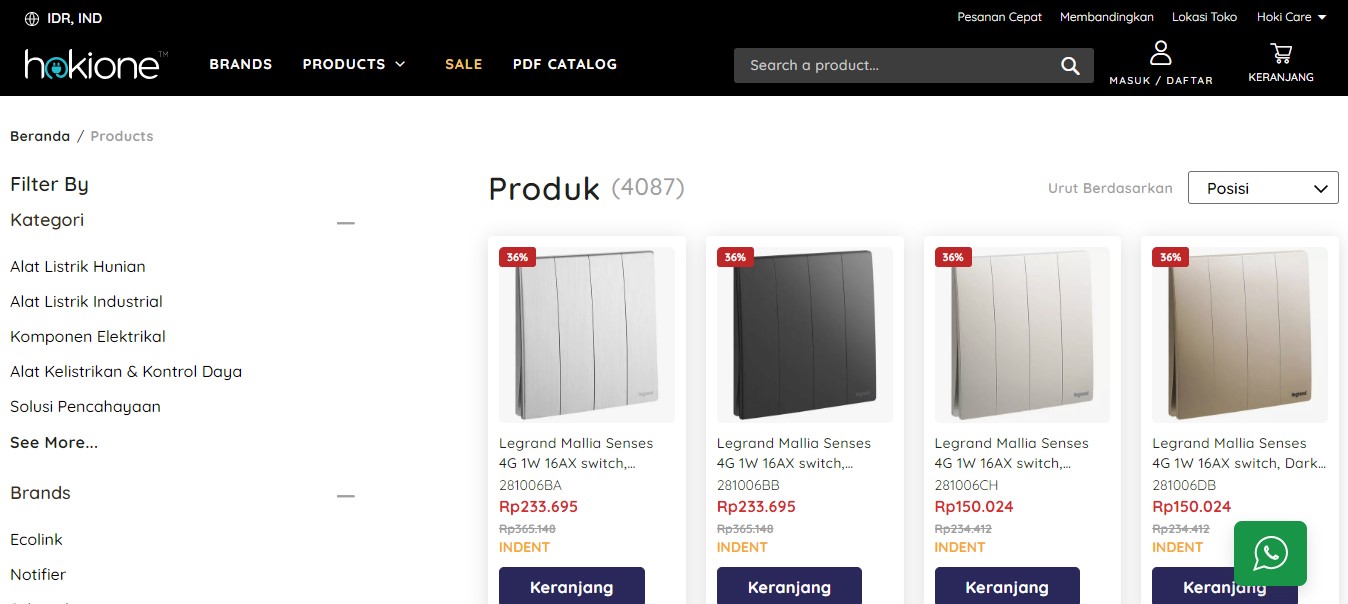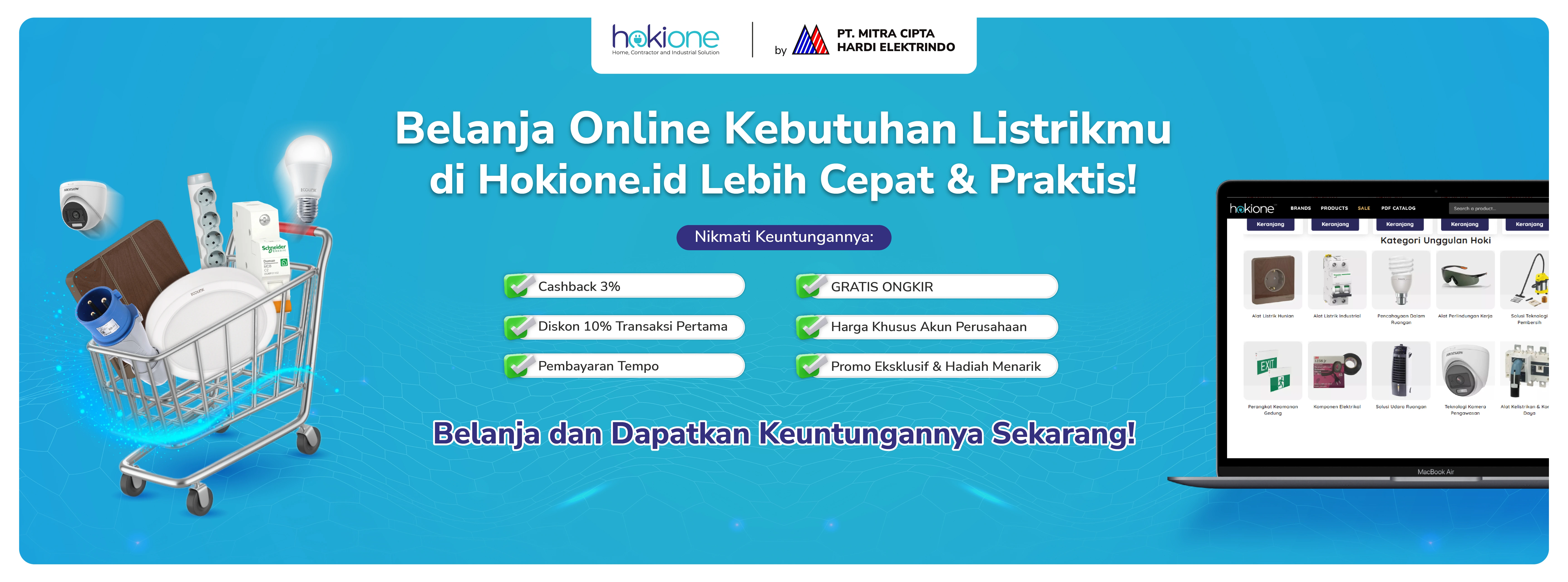Perbedaan Marketplace dan E-commerce, Mana yang Paling Cuan untuk Bisnis Online?

Perbedaan marketplace dan e-commerce dalam dunia bisnis online penting diketahui, terutama bagi Anda yang memiliki rencana memasarkan produk atau jasa melalui internet di era digital seperti sekarang.
Bisnis online saat ini hampir mengalahkan popularitas bisnis offline seiring perkembangan era digital yang semakin maju. Mungkin Anda sering mendengar istilah seperti “marketplace” dan “e-commerce” ketika membahas bisnis online.
Kedua istilah itu kerap kali disamakan, padahal marketplace dan e-commerce memiliki perbedaan yang signifikan, lho! Mau tahu apa perbedaan marketplace dan e-commerce dan konsep mendetail di antara keduanya? Yuk simak penjelasan di bawah ini.
Baca Juga: Perbedaan Load Break Switch dan Circuit Breaker untuk Memutus Arus Listrik
Apa Itu Marketplace?
Marketplace atau dalam bahasa Indonesia dirtikan sebagai “lokapasar” adalah tempat berbagai penjual (seller) dapat menjual produk atau jasa mereka kepada pelanggan. Sebuah marketplace dapat berupa situs web atau aplikasi yang menyediakan ruang virtual bagi penjual untuk berdagang.
Marketplace bertindak sebagai fasilitator yang menjadi perantara atau tempat menghubungkan pembeli dan penjual untuk bertransaksi. Transaksinya dilakukan secara online (dalam jaringan).
Marketplace hanya menyediakan alat untuk komunikasi seperti fitur chat, macam-macam metode pembayaran yang aman, dan layanan pengaduan apabila terjadi sengketa antara penjual dan pembeli.
Pengelola marketplace tidak bertindak sebagai penjual barang atau jasa, bisnis mereka hanya menjadi perantara, mirip seperti pemilik gedung mall di dunia nyata yang hanya menyediakan tempat dan fasilitas untuk para tenant atau brand.
Contoh marketplace yang terkenal di dunia adalah Amazon, eBay, dan Etsy. Sementara di Indonesia, marketplace yang umum digunakan adalah Tokopedia, Shopee, Lazada, BukaLapak, dan lainnya.
Apa Itu E-commerce?
E-commerce yang merupakan singkatan dari electronic commerce, adalah ruang online untuk menjual produk atau layanan melalui internet, mulai dari barang bentuk fisik hingga layanan digital.
merujuk pada proses pembelian dan penjualan barang atau jasa melalui internet yang mencakup segala jenis transaksi perdagangan elektronik, mulai dari pembelian produk fisik hingga layanan digital.
Platform e-commerce berfokus pada branding yang menampilkan misi, cerita, dan unique selling proposition (USP) dari suatu merek atau perusahaan.
Biasanya berupa situs web atau aplikasi, platform e-commerce memungkinkan bisnis untuk menjaring pelanggan lebih luas melalui dunia digital, merinci penawaran dan strategi bisnis, serta menjual layanan dengan lancar.
Platform e-commerce dikelola satu perusahaan atau brand yang memfasilitasi pelanggan untuk membeli produknya secara online. Dengan platform ini, perusahaan atau brand dapat menganalisis pasar, mengelola penjualan, menerima pembayaran, dan melacak keterlibatan pelanggan secara online untuk menyempurnakan strategi pemasaran digital.
Baca Juga: 3 Tips Memilih Sakelar dan Stopkontak Terbaik di Rumah, Jangan Salah Pilih!
Perbedaan Marketplace dan E-commerce
1. Kepemilikan
Kepemilikan e-commerce berada di tangan suatu bisnis, perusahaan, atau merek, memberikan kontrol penuh atas operasi dan pengambilan keputusan. Sementara itu, kepemilikan marketplace ada pada satu entitas, yang menghosting dan memfasilitasi transaksi untuk banyak penjual.
2. Daftar Produk atau Layanan
Pada e-commerce, produk atau layanan yang ditampilkan berasal dari satu sumber yang sudah terdaftar. Sedangkan di dalam marketplace, berbagai vendor di satu tempat menjual produk atau layanan mereka sendiri.
3. Branding
Branding marketplace membentuk identitas terpadu dan mudah dikenali untuk platform online, terpisah dari penjual individual. Sementara melalui platform e-commerce, suatu bisnis dapat membagikan identitas merek yang unik dengan kontrol penuh atas semua aspek.
4. Interaksi dengan Pelanggan
Interaksi penjual dengan pelanggan di marketplace biasanya lebih terbatas karena sebagian besar komunikasi dilakukan melalui platform. Sementara melalui e-commerce, komunikasi dan interaksi antara penjual dan pelanggan bisa terjadi secara langsung, mendorong keterlibatan yang lebih personal.
5. Pemasaran
Melalui e-commerce, sebuah bisnis bertanggung jawab atas upaya pemasaran dan branding sendiri untuk menarik dan melibatkan pelanggan. Berbeda dengan marketplace, platform biasanya memimpin dalam promosi yang lebih umum sehingga opsi iklan terbatas untuk seller individual.
Powered by Froala Editor

E-commerce Hokione, Platform Belanja Online Masa Kini
Salah satu contoh e-commerce yang ada di Indonesia adalah situs web bernama Hokione yang bisa diakses di www.hokione.id. Platform ini merupakan tempat belanja online kebutuhan elektrikal dan mekanikal, baik di skala rumahan hingga industri.
Dikelola oleh PT Mitra Cipta Hardi Elektrindo, e-commerce Hokione melayani kebutuhan pelanggan akan alat-alat listrik, mulai dari sakelar, stopkontak, MCB, inverter, hingga UPS. Tak hanya itu, tersedia juga kebutuhan lainnya, seperti alat pembersih profesional, alat keamanan gedung, dan keselamatan kerja.
Hokione adalah wujud platform e-commerce yang menonjolkan kemudahan penggunaan (user-friendly) yang dapat dirasakan dari fitur dan tampilannya.
Didukung dengan proses pemesanan yang mudah, metode pembayaran yang aman dan banyak pilihan, layanan pelanggan maksimal, serta proses pengiriman yang cepat, Hokione menjadi salah satu platform e-commerce yang menjawab kebutuhan belanja para pengguna.
Dengan memahami perbedaan antara marketplace dan e-commerce, pengusaha dan konsumen dapat membuat keputusan yang lebih tepat dalam menjalankan atau menggunakan platform yang sesuai dengan kebutuhan. Meskipun keduanya memiliki perbedaan yang mendasar, baik e-commerce maupun marketplace tetap menjadi bagian penting dari ekosistem perdagangan digital saat ini.
Powered by Froala Editor
Related News


